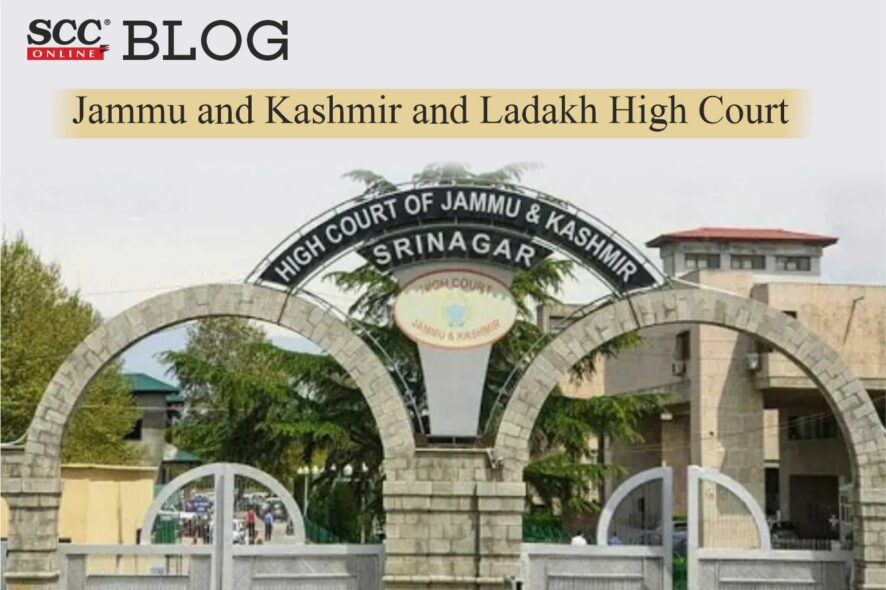Jammu and Kashmir and Ladakh High Court: While deciding the instant petition wherein the issue was that whether the change of user (misuse of a building from residential to commercial or vice versa) in violation of the permitted land use as per the master plan for an area to which the Jammu and Kashmir Control of Building Operations Act, 1988 applies, would fall within the ambit of unauthorized ‘erection or re-erection' as contemplated under Section 7 read with Section 8 of the afore-stated 1988 Act; the Division Bench of Wasim Sadiq Nargal and Tashi Rabstan, JJ., observed that in a democratic polity governed by the rule of law, the State by no stretch of imagination, can deprive a citizen of his/her property without the sanction of law, besides complying with the procedure envisaged in the statutory provision.
Facts and Contentions: The petitioners were aggrieved with the sealing of their property, for which a notice was issued as per the provisions of Jammu and Kashmir Control of Building Operations Act, 1988. However, the petitioners alleged that no such notice was ever served to them before their properties were sealed.
The counsel for the petitioners contended that no notice was served upon them, and their properties were sealed without affording them any chance of being heard, which in turn violated the principles of natural justice. It was also submitted that the respondents did not apply their mind and verified the ground reality concerning the petitioners' property while issuing the impugned notice.
Per contra, the respondents argued that the petitioners were renovating the building for commercial use which necessitated the action of sealing the building for the purpose of carrying out the provisions of the 1988 Act.
Observations
-
Perusing the impugned notice and the relevant provisions of Jammu and Kashmir Control of Building Operations Act, 1988, the Court pointed out that it was not apparent as to what was the nature of work the petitioners commenced which led the respondents to conclude that the building would be put to commercial use. It was further noted that no record or details of the commercial activities have been specified in the impugned notice.
-
It was observed that the Building Operation Controlling Authority is empowered to pass an order of sealing in appropriate cases. However, exercise of such power rests upon the nature of allegations justifying such exercise. Each and every violation of building permission would not justify invoking the power to seal the premises followed by an order of demolition.
-
The Court also pointed out that Sections 7 and 8 of the 1988 Act are interlinked, inasmuch as sealing order can be issued in respect of such erection or re-erection about which action under Section 7 has been or is intended to be taken. A conjoint reading of Sections 7 and 8 of the 1988 Act makes it clear that Section 7(1) provides for issuance of show cause notice and Section 7(3) provides for passing the demolition order, if the show cause notice is not replied or the reply is not satisfactory. It also provides for hearing the person to whom the notice has been issued before issuing demolition order under Section 7(3) of the Act.
-
Regarding the principles of natural justice, the Court stated that where any action or an order which is likely to have consequence or depriving a person from legal possession of the property, is to be taken or is to be passed by a statutory authority, an opportunity of hearing should be given to him or her firstly and only thereafter, such order could be passed. The minimum requirement of principles of natural justice is that no person shall be condemned unheard before passing any order which violates an individual’s rights.
-
Depriving a person of his property without adopting a due course of law amounts to violation of his constitutional right as enshrined in the Constitution. Art. 300-A of the Constitution provides that no person shall be deprived of his/her property save by authority of law. The State cannot dispossess a citizen of his property except in accordance with the procedure established by law. To forcibly dispossess a person of his private property without following due process of law would be violative of a human right and also the constitutional right.
Decision: With the afore-stated observations, the Court held that neither the respondents specified any reasons regarding commercial activity being carried by the petitioners nor they have specified the reason that how the petitioners have put the building for commercial use. There is no whisper in the impugned notice about any erection, re-erection or work of premises in which such erection, re-erection; and the notice was issued without any application of mind.
The Court thus quashed the impugned sealing notice issued under the provisions of Jammu and Kashmir Control of Building Operations Act, 1988 and directed the respondents to de-seal the properties.
[Meenakshi Chouhan v. Jammu Municipal Corpn., 2022 SCC OnLine J&K 593, decided on 29-07-2022]
Advocates who appeared in this case :
Rohit Kohli, Advocate, for the Petitioners;
S. S. Nanda, Sr. AAG, Advocate, for the Respondents.
*Sucheta Sarkar, Editorial Assistant has prepared this brief







